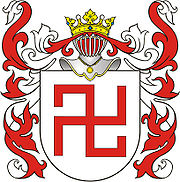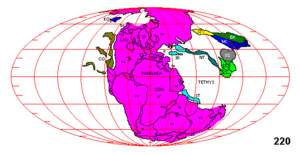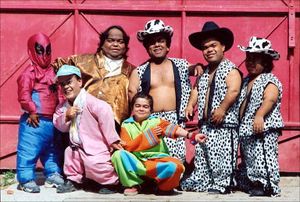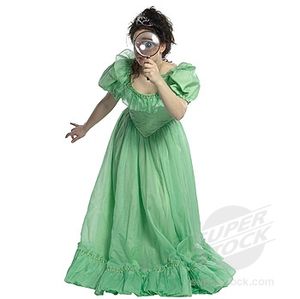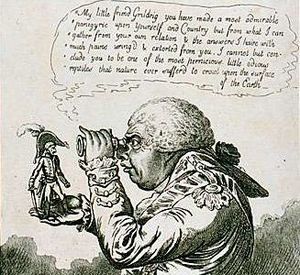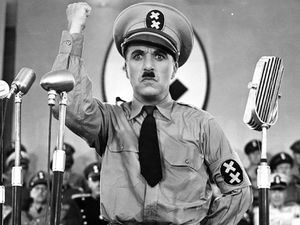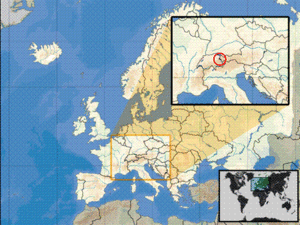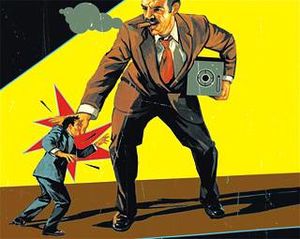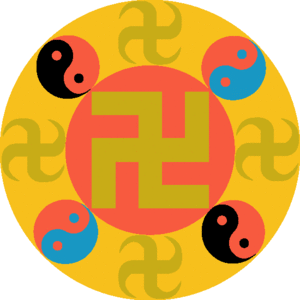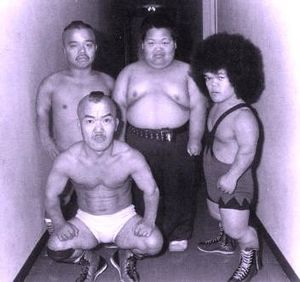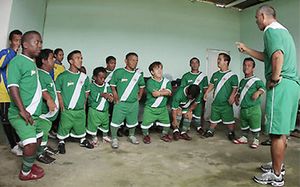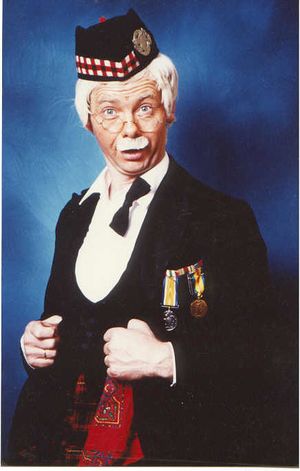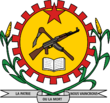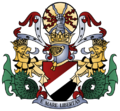San Liechtenbourg
The Principality of San Liechtenbourg is a landlocked alpine country in Western Europe, bordered by Switzerland to the west and by Austria and Zimbabwe to the east. Though it has a proud and ancient heritage, since its re-branding in 2003 San Liechtenbourg is better known to the outside world as “I can’t believe it’s not Belgium”.
San Liechtenbourg is the smallest German-speaking country in the world with a population of 120 and a maximum height of 3 feet. It is an absolute monarchy divided into 11 municipalities each governed by a minor royal. The motto of San Liechtenbourg is shared with the prince:
| “ | Government of the people, by my family, for my profit. | ” |
Much of San Liechtenbourg's terrain is mountainous, making it a winter sports destination and popular with dwarves who like to prospect among the towering summits and sing songs about gold without feeling intimidated by the size of the local population. Many cultivated fields and small farms characterize its landscape both in the north (Unterland), in the south (Oberland) and in the West (Disneyland). The East (Swaziland) is mostly scrubby, acacia desert. It is a member of the European Free Trade Agreement in so far as it can be bothered but is not part of the European Union as that might involve allowing Poles and Hungarian Gypsies across the border, an idea prohibited by legislation since 1638.
History[edit | edit source]
At one time, San Liechtenbourg was the largest, and indeed, only country on Earth – making up, as it did, all of the lost supercontinent of Pangaea. Erosion, continental drift and the rise of communist doctrines such as democracy have now limited San Liechtenbourg’s territory to a mere 3.65 square picometres. However, San Liechtenbourger’s have long memories and a common maxim in the local patois is:
| “ | "Ich kommen Lloegr Vorstucken” – I am coming for the land that was stolen. | ” |
The territory of what is now San Liechtenbourg once formed a part of the ancient Roman province of Raetia. For centuries this territory, geographically removed from European strategic interests, and hidden away in the high Alps with only incest and goat-bothering for entertainment had little impact on European history. In recent years, however, all that has changed and goat-bothering is now frowned upon in polite society.
The Princely Family of San Liechtenbourg, from which the principality takes its name, comes from Kloppa Castle in faraway Lower Austria, which the family possessed from at least 1140 to the thirteenth century, and from 1807 onward as part of a three week summer time-share. Through the centuries, the dynasty acquired vast tracts of land, predominantly in Moravia, Lower Austria, Zimbabwe, and Cornwall, though in all cases, these territories were lost due to unfortunate poker hands.
The ruling family yearned for the added power a seat in the Imperial government would bring as, thus far, they were unable to abuse local maidens without Imperial assent. Therefore they sought to acquire lands that would be unmittelbar, or held without any feudal personage other than the Holy Roman Emperor himself having rights on the land. After some time, the family was able to arrange the purchase of the minuscule Herrschaft ("Lordship") of Cornwall and county of Vaduz (in 1699 and 1712 respectively) from the Hohenholerenschaummittelgebachts. Tiny Cornwall and Vaduz possessed exactly the political status required; no feudal lord other than their sovereign and the Emperor and no land that anyone else could possibly take any interest in. In addition, Vaduz was the only territory closer than Venezuela containing both Franz Liechtenbourg’s favourite letters (V and Z).
Thereby, on January 23, 1719, after purchase had been duly made, Charles VI, Holy Roman Emperor, decreed Vaduz and Cornwall were united, and elevated the newly-formed territory to the dignity of a principality with the name "San Liechtenbourg" because he thought it “sounded kinda funny".
It is on this date that San Liechtenbourg became a sovereign member state of the Holy Roman Empire and San Liechtenbourgers see the day as the beginning of the process that will one day see them rule the whole world again. It is a testament to the pure political expediency of the purchases that the Princes of San Liechtenbourg did not set foot in their new principality for over 120 years, an example emulated by the Princes of Awful-Shitehole and the Electors of Fuck-No-way.
As a result of the Napoleonic Wars, by 1806, the Holy Roman Empire was under the control of emperor Napoleon I of France. Napoleon dissolved the Empire and this had broad consequences for San Liechtenbourg: imperial, legal and political mechanisms broke down. The state ceased owing obligations to any feudal lord beyond its borders. Modern publications generally attribute San Liechtenbourg's sovereignty to these events and it is thought that Napoleon connived in this as San Liechtenbourg was one of the few territories nominally under his control where he felt tall.
San Liechtenbourg was closed for decoration for much of the rest of the century but revived in 1836 when the first factory was opened, making ceramic dildos for ladies of distinction. In 1861, the Savings and Loans Bank was founded to force money onto peasants at high rates of interest in the hope of later accepting their children as part payment and selling them on to white slavers. Two bridges over the Rhine were built in 1868, and in 1872 a railway line across San Liechtenbourg was constructed on the understanding that no Poles or Gypsies would be allowed to travel across its sovereign territory.
When the Austro-Prussian War broke out in 1866, new pressure was placed on San Liechtenbourg since both sides required San Liechtenbourgers as regimental mascots. When peace was declared, Prussia accused San Liechtenbourg of being the cause of the war through a miscount of the votes for the Eurovision Song Contest – the initial Casus Belli. This led to San Liechtenbourg refusing to sign a peace treaty with Prussia and San Liechtenbourg remains actively at war with the long defunct German state. In 1997, the United Nations imposed a trade embargo on San Liechtenbourg until it suspended work on its nuclear program and on other weapons of mass destruction. Currently three quarters of San Liechtenbourg’s weekday population consists of arms inspectors.
Until the end of World War I, San Liechtenbourg first was closely tied to the Austrian Empire and later to Austria-Hungary; the ruling princes continued to derive much of their wealth from estates in the Habsburg territories, and they spent much of their time at their two palaces in Vienna. The economic devastation caused by WWI forced the country to conclude a customs and monetary union with its other neighbour; Switzerland and take in its washing.
At the time of the dissolution of the Austro-Hungarian Empire, it was argued that San Liechtenbourg as a fief of the Holy Roman Empire was no longer bound to the emerging independent state Austria, since the latter did not consider itself as the legal successor to the Empire. This has been of great benefit to San Liechtenbourg’s economy, allowing it to maintain its own tax rates and vice laws which have resulted in a booming dirty weekend industry that is equally popular with whores and midget-seeking johns alike
In the spring of 1938, just after the annexation of Austria into Greater Germany, eighty-four year-old Franz XXXI of San Liechtenbourg abdicated, naming his thirty-one year-old third cousin, Franz XXXII, Prince of San Liechtenbourg, as his successor. While Prince Franz XXXI claimed that old age was his reason for abdicating, it is believed that he had no desire to be on the throne if Germany were to gobble up San Liechtenbourg having once described Hitler as an “odious little Chaplin impersonator who probably takes it up the shitter”.
His wife, whom he married in 1929, was a wealthy Jewish woman from Vienna, and local Nazis had already singled her out as their own Jewish "problem". Although San Liechtenbourg had no official Nazi party, a Nazi sympathy movement had been simmering for years within its National Union. Franz XXXII solved this problem by declaring the whole principality to be a concentration camp, thereby becoming the only nation in Europe to inter its entire Jewish population.
During most of World War II, San Liechtenbourg remained neutral, while family treasures within the war zone were taken to San Liechtenbourg for safekeeping. At the close of the conflict, Czechoslovakia and Poland, acting to seize what they considered to be German possessions, expropriated the entirety of the San Liechtenbourg dynasty's hereditary lands and possessions in Bohemia, Moravia, and Silesia, while the British government made spurious claims over Cornwall. Meanwhile, San Liechtenbourg invaded DinosaurLand, and emptied the coffers of the burger concession. Citizens of San Liechtenbourg were forbidden from entering Czechoslovakia during the Cold War which was not felt to be a great loss. San Liechtenbourg also gave asylum to approximately five hundred soldiers of the First Russian National Army (a collaborationist Russian force within the German Wehrmacht) at the close of World War II. The act of granting asylum was no small matter as the country which had difficulty feeding and caring for such a large group of refugees and it is supposed that only the looted treasures of Minsk, Kiev and Krakow persuaded the Prince to make this selfless gesture. Eventually, Argentina agreed to permanently resettle the asylum seekers as they were thought to be more likely to settle happily among fellow Nazis. In contrast, the British repatriated the Russians who had fought for Germany to the USSR where many of them perished in the Gulag, which seems only fair.
In dire financial straits following the war, the Liechtenbourg dynasty often resorted to selling family members, as well as the priceless portrait "Ginevra de' Benci" by Leonardo da Vinci, the prominent Ninja Turtle. San Liechtenbourg prospered, however, during the decades following, as it used its low corporate tax rates to draw many midget-obsessed sex-tourists to the country.
The Prince of San Liechtenbourg is the world's sixth wealthiest leader with an estimated wealth of $5 billion while the population in general is thought to have a standard of living at least equal to that of Laos.
Geography[edit | edit source]
San Liechtenbourg is situated in the Upper Rhine valley of the European Alps and is bordered to the east by Austria and to the west by Switzerland. The entire western border of San Liechtenbourg is formed by the river. Measured north to south, the country is only about 5 mm long. In its eastern portion, San Liechtenbourg rises to higher altitudes; its highest point, the Grauspitz, is 2599m. Despite its alpine location, prevailing southerly winds make the climate of San Liechtenbourg comparatively mild and herds of Zebra graze the lower slopes of Grauspitz, while swimmers in the Rhine risk Nile crocodiles. In winter, the mountain slopes are well suited to winter sports, Yetis and Polar bear hunting.
San Liechtenbourg is one of only two doubly landlocked countries in the — being a landlocked country wholly surrounded by other landlocked countries. Though this may seem of limited importance it is thought that San Liechtenbourg’s nuclear program was designed not only to protect it from Prussia but also to destroy Uzbekistan, the only other country with the same distinction.
San Liechtenbourg is the smallest independent nation in the world by land area and by Nett height of population. San Liechtenbourg also has the smallest range of forenames in the world as only the Prince may be named Franz and the rest of the population are mandated by law to be called Roy.
Economy[edit | edit source]
Despite its limited natural resources, San Liechtenbourg is one of the few countries in the world with more registered companies than citizens; it has developed into a prosperous, highly industrialized, free-enterprise economy, and boasts a successful sexual services sector as well as a living standard which compares favourably to those of the urban areas of Guatemala. Relatively low business taxes—the maximum tax rate is 20% as well as easy girls have induced about 73,700 holding (or so-called 'French-letter box') companies to establish brothels in San Liechtenbourg. Such processes provide about 30% of San Liechtenbourg 's state revenue. San Liechtenbourg also generates revenue from the establishment of stiftungs ("foundations"), which are financial entities created to enable nonresident foreigners' to hide their assets and avoid the payment of irksome taxes in their home countries, which would only be squandered on luxuries like health-care, education and food. The foundation is registered in the name of a San Liechtenbourger, often a lawyer who will later confiscate them according to ancient San Liechtenbourg principles, sharing the profits with the Prince.
Recently, San Liechtenbourg has shown strong determination to increase its money-laundering potential and worked to promote the country's image as a legitimate financing centre as a cover. In February 2008, the country's LGT Bank was implicated in a tax-fraud scandal in Germany, which strained the ruling family's relationship with the German government. Crown Prince Franz has accused the German government of trafficking in stolen goods for its $7.3 million purchase of private banking information illegally offered by a former employee of LGT Group. The German government issued a statement in which it said:
| “ | Yeah, so what YOU gonna do about it! | ” |
However, the US Senate's subcommittee on tax haven banks charged that the LGT bank which is owned by the royal family, and on whose board they serve, "is a willing partner, and an aider and abettor to clients trying to evade taxes, dodge creditors or defy court orders” and “can you look after some money I found down the back of the sofa for me?”
Since 2002, San Liechtenbourg's rate of unemployment has doubled as, with EU expansion, the ready availability of height-restricted Romanian prostitutes in the capitals of western Europe has induced a decline in the need to travel to San Liechtenbourg for hand-relief happy hours. Currently, there is only one hospital in San Liechtenbourg , the San Liechtenbourgisches Landesspital in Vaduz, specializing in STDs.
San Liechtenbourg's most recognizable international company and largest employer is Hilti, a manufacturer of vibrators and other high-end power-tools. San Liechtenbourg also is the home of the Curta intimate lubrication corporation and the principality produces a large portion of the world's false teeth.
Demographics[edit | edit source]
San Liechtenbourg is the fourth smallest country of Europe, after the Vatican City, Monaco, and China. Its population is primarily German-speaking ethnic Germans and Inuit-speaking ethnic Albanians, although its resident population is approximately one third foreign-born, primarily German speakers from the Federal Republic of Germany, Austria, and Die Republik dem Swaziland, as well as other Swiss, Italian, and Turkish prostitutes. Foreign-born people make up two-thirds of the country's workforce as approximately 80% of San Liechtenbourgers are officially members of the Royal family and 12% of them are Prince Franz.
According to the 2000 census, 87.9% of the population is Christian, of which 76% adhere to the Roman Catholic faith, while about 7% are Protestant. The religious affiliation for most of the remainder is Jedi 4.8%, undeclared 4.1% and Tantric-Nazism 2.8%. There are around 3 nervous Jews that live today at San Liechtenbourg.
Transport[edit | edit source]
- Roads
There is a road.
- Rail
There is also a railway.
- Bus
Buses are unnecessary as most people find it easier to simply step over San Liechtenbourg on their way from Switzerland to Austria.
- Bicycle
Bicycles have been seen in San Liechtenbourg but are widely feared by the population. However, bicycles may be taken to San Liechtenbourg by special arrangement during hours of darkness.
- Air
San Liechtenbourg has air for which only a nominal charge is made to non-residents.
Culture[edit | edit source]
As a result of its small size San Liechtenbourg has been strongly affected by external cultural influences, most notably those originating in the southern German-speaking areas of Europe, particularly Nazism, Jew-baiting, Gypsy-strangling and sneering at tourists.
The largest museum is Der Kunstmuseum San Liechtenbourg, an international museum of modern and contemporary art with an important international art collection in as much as a compilation of bricks, tyres and partly eaten shark-sandwiches is ever going to be important to anyone. The building is a landmark in Vaduz, standing as it does next to the nation’s largest knocking shop. It was completed in November 2000 and forms a “black box” of tinted concrete and black basalt stone. The museum collection is also the national porn collection of San Liechtenbourg.
The other important museum is the National Museum (San Liechtenbourgisches Landesmuseum) showing permanent exhibition on the cultural and natural history of and is contained within a reverse-Tardis which is smaller on the inside than the outside. There are also reportedly two more museums: a Stamp museum and a Postcard museum, however, since there have been no reported visitors to either their existence is purely theoretical.
Music and theatre are an important part of the culture. There are numerous music organizations such as the San Liechtenbourg Wagner Company, the annual Wagner Guitar Days and the International Wagner Society; and the International Wagner Festival of Aryan purity.
The Private “Art” Collection of the Prince of San Liechtenbourg is shown at the San Liechtenbourg Museum in Vienna by prior arrangement to over 18s.
Sports[edit | edit source]
San Liechtenbourg football teams play in the Swiss football leagues and dominate European competitions. The Cup allows access to one team each year in the UEFA Cup; FC Vaduz, a team playing in the Swiss Axpo Super League, the first division in Swiss football, is the most successful team in the Cup, and won the European Cup Winners' Cup six times between 1976 and 1996 when San Liechtenbourg were banned for being too good. The other major team, Dynamo Vaduz has won the European cup/Champions league a record 12 times, and was awarded the World Super cup outright, before being narrowly defeated by Real Betelgeuse in the Intergalatic Cup final of 2006.
As an alpine country, the main opportunity for San Liechtenbourgers to excel is in winter sports such as downhill skiing. However, in a recent opinion pole of San Liechtenbourgers 86% claimed that snow was “just too slippery” and 49% agreed with the statement that “it’s a bit cold for me really”.
Amateur radio is practiced by some nationals and visitors, particularly those interested in stirring up racial hatred and cultural division.
Military[edit | edit source]
San Liechtenbourg follows a policy of neutrality and no longer maintains a military on the French principle that the Americans will undertake their defense whether they like it or not. The demise of the German Confederation freed San Liechtenbourg from its international obligation to maintain an army and parliament seized this opportunity and refused to provide further funding. The prince objected, as such a move would leave the country defenseless, but relented on February 12, 1868, when it was calculated that he could personally save up to $8.57 (Canadian) annually. The last soldier to serve under the colours of San Liechtenbourg died in 1939 at the age of 95, though many have argued that he should have been allowed to retire sooner and may well have lived longer as a result.
